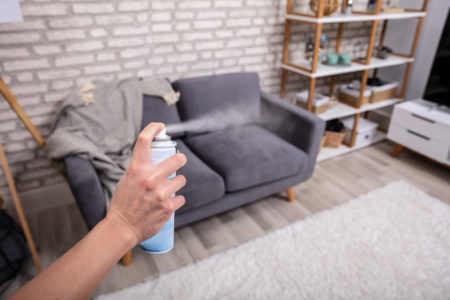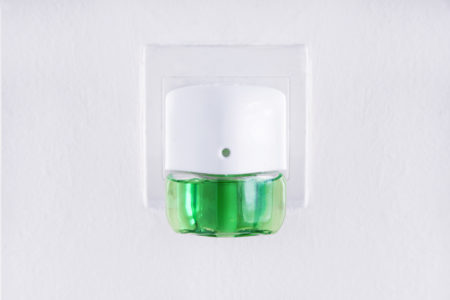
Share On Social!
Fragrances can make a home go from smelling objectionable to welcoming — they can also cause severe health concerns in sensitive individuals.
Researchers studied the substances found in these products for years, and their results communicate a serious message: Air fresheners have the potential to trigger bodily reactions such as respiratory problems, migraine headaches, and asthma attacks.
Their largest concern? The data showed that about a quarter of the ingredients in these products are toxic.
These chemicals also can trigger Toxicant-Induced Loss of Tolerance (TILT) in those exposed.
“Fragranced consumer products, such as cleaning supplies, air fresheners, and personal care products, are a primary source of indoor air pollutants and personal exposure,” writes Dr. Anne Steinemann, a professor at the University of Melbourne, Australia who studies environmental exposures and their adverse effects. “Previous research indicates that fragranced products can trigger adverse health effects, with implications for workplaces and public places.”
Chemicals that Cause Concern
Fragrance products contain various substances that pose a threat to the human body, including: 
- Volatile organic compounds (VOCs)
- Formaldehyde
- Phthalates
- 1,4 dichlorobenzene
These chemicals can cause several adverse reactions such as nausea, headaches, liver damage, and bronchitis.
Worse, the substances in fragrance sprays have a more significant effect on children.
“Kids don’t have a complete metabolic system—they can’t process things the way adults do,” said Kent Pinkerton, director of the Center for Health and the Environment at the University of California Davis, told Considerable. “Whatever is in the air, a child may have as many as 30 times greater exposure because of their size and their level of activity.”
Latino Air Freshener Use
This is an issue that directly impacts Latinos.
This demographic is among the top purchasers of air fresheners, according to a 2012 report from Mintel, a global marketing agency.
Additionally, companies have begun marketing these products directly to the Latino community by creating fragrances that appeal to that demographic, according to the Houston Chronicle.
Certain air fresheners or other fragrance products have been created specifically for Latino buyers and they contain chemicals that research has shown may be toxic.
Precautions to Take
Some doctors are not sure whether fragrance sprays should be banned from use, according to Considerable.
“But certainly some of the chemicals that have been measured from air fresheners should draw caution,” Pinkerton said.
For those who want to remove these exposures from their homes, researchers recommend taking several steps: 
- Remove all fragrance products, including sprays, candles, and perfume
- Brew mint tea or grind up oranges for aroma alternatives
- Open the windows and use the natural environment to remove smells
While this form of exposure might not affect all average fragrance spray users, those who are experiencing adverse side effects might be suffering from TILT.
Exposures can initiate or trigger health complications such as those listed above.
Most who are suffering from these side effects might not even know that TILT is the cause, according to Dr. Claudia Miller, an environmental health professor and leader of the Hoffman TILT program at UT Health San Antonio.
“TILT can happen to anyone with sufficient exposure, and result in lifelong, disabling illness,” Miller writes. “Diverse chemicals, pesticides, solvents, diesel exhaust, and myriad indoor air contaminants outgassing from new construction or remodeling materials can initiate TILT.”
Miller urges people to use Hoffman TILT’s free assessment resources to discover whether or not chemical intolerance is affecting them.
“Preventing initiation, early recognition, and rapid intervention are paramount,” Miller said. “Prevention starts with educating health professionals and eliminating exposures in hospitals and medical facilities.”
Editor’s Note: This article is part of a collaboration between Salud America! and the Hoffman Toxicant-Induced Loss of Tolerance (TILT) program at UT Health- San Antonio. To find out if you are TILTed due to exposure to everyday foods, chemicals, or drugs, take a self-assessment or learn more about TILT.
Explore More:
Chemical & Toxic ExposureBy The Numbers
1
Quick Survey
Can help you find out how chemically sensitive you are



